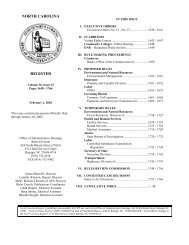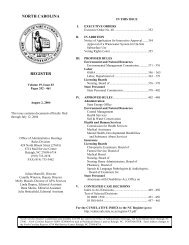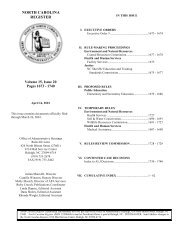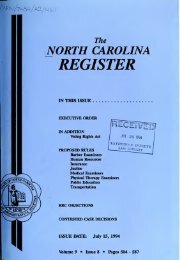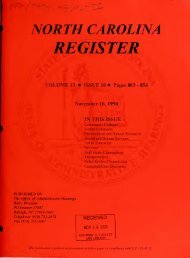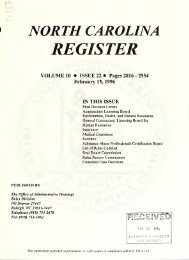NC Register Volume 19 Issue 06 - Office of Administrative Hearings
NC Register Volume 19 Issue 06 - Office of Administrative Hearings
NC Register Volume 19 Issue 06 - Office of Administrative Hearings
You also want an ePaper? Increase the reach of your titles
YUMPU automatically turns print PDFs into web optimized ePapers that Google loves.
PROPOSED RULESunauthorized overtime. Unauthorized work shall be counted ashours worked if the employer should have stopped it but did not,or if the employer knows or has reason to know <strong>of</strong> this practice.Each agency is responsible for internal controls which willprovide a means <strong>of</strong> reviewing and evaluating the use <strong>of</strong>overtime.(d)(c) The practice <strong>of</strong> overtime work will be subject to reviewby the <strong>Office</strong> <strong>of</strong> State Personnel. Such review will take intoconsideration organizational structure, scheduling <strong>of</strong> work,position complement, and personnel classifications.Authority G.S. 126-4.25 <strong>NC</strong>AC 01D .<strong>19</strong>28 COMPENSATION – NON-EXEMPT(a) The non-exempt employee shall receive straight-time pay fora standard 40-hour workweek, with the provision that anadditional amount equal to time and one-half the employee'sregular hourly rate multiplied by the number <strong>of</strong> hours worked inexcess <strong>of</strong> 40 shall be added to the base pay. Such payment mustbe made in form <strong>of</strong> monetary compensation or compensable time<strong>of</strong>f. It is the policy <strong>of</strong> the State <strong>of</strong> North Carolina, wheneverpossible, to give compensatory time <strong>of</strong>f, in lieu <strong>of</strong> monetarycompensation for hours worked in excess <strong>of</strong> 40 hours per workweek. The decision as to whether to give compensatory time<strong>of</strong>f, rather than monetary compensation, for overtime worked issolely within the discretion <strong>of</strong> management. Compensatory time<strong>of</strong>f shall be scheduled by management, although reasonableeffort shall be made to accommodate the employee as to suchscheduling.(b) An employee shall be given compensatory time <strong>of</strong>f on thebasis <strong>of</strong> one and one-half times the amount <strong>of</strong> time workedbeyond 40 hours during a week. Compensatory time may beaccumulated up to a maximum <strong>of</strong> 240 hours (160 hours straighttime) and shall be taken within 12 months from the date theovertime is performed. If compensatory time <strong>of</strong>f is not given bythe end <strong>of</strong> the 12-month period, the overtime pay shall beincluded in the employee's next regular paycheck. Any overtimeworked above this amount shall be paid in the employee's nextregular paycheck. Overtime worked shall be recorded andcompensated in units <strong>of</strong> one-tenth <strong>of</strong> an hour.NOTE: The preceding provisions are not applicable to personsin law enforcement or fire protection activities and in residenceemployees.(c) Prior to employment, each successful candidate for stateemployment in a position subject to hours <strong>of</strong> work and overtimepay standards must sign a form acknowledging that it has beenexplained to him that it is the state's policy to give time <strong>of</strong>f inlieu <strong>of</strong> monetary compensation, wherever possible, for hoursworked beyond 40 in a work week. Agreement to this is acondition <strong>of</strong> employment with the state; failure or refusal to signsuch agreement will prevent employment <strong>of</strong> that person. Thissigned form shall be a part <strong>of</strong> the employee's personnel file; itmust be kept for at least three years following that person'sseparation from state employment.(d) Upon transfer to another agency or termination <strong>of</strong>employment, an employee shall be paid for unusedcompensatory time <strong>of</strong>f at a rate <strong>of</strong> compensation not less thaneither the average regular rate received by such employee duringthe last three years <strong>of</strong> the employee's employment or the finalregular rate received by such employee, whichever is higher.Authority G.S. 126-4.25 <strong>NC</strong>AC 01D .<strong>19</strong>29 HOURLY RATE OF PAY(a) The hourly rate <strong>of</strong> pay is the rate published by the <strong>Office</strong> <strong>of</strong>State Personnel and is obtained by dividing the annual salary by2080 hours (52 weeks multiplied by 40 hours per week).(b) The rate that must be used in computing overtime is referredto as the regular hourly rate. The regular hourly rate mustinclude all remuneration for employment paid to, or on behalf<strong>of</strong>, the employee, except payments specifically excluded by theAct. Payments that are not excluded and must be included in thehourly rate are:(1) Shift Premium Pay;(2) Longevity Pay;(3) On-Call Compensation.These payments must be included in order to comply with theprovisions <strong>of</strong> the Fair Labor Standards Act (FLSA).(c) Longevity pay must be included in the regular rate whencomputing overtime. However, to avoid recomputations whenovertime is due, the following procedure may be used: At theend <strong>of</strong> each calendar year, the total dollar amount <strong>of</strong> overtimepaid is determined and this amount is multiplied by the percent<strong>of</strong> the employee's longevity pay rate.(d) Overtime for an employee working in two positions withdifferent rates <strong>of</strong> pay is paid at the average <strong>of</strong> the two rates <strong>of</strong>pay for each position.Authority G.S. 126-4.25 <strong>NC</strong>AC 01D .<strong>19</strong>30 NON-OVERTIMEWORKWEEKSWhen an employee works 40 hours or less during a workweekbecause <strong>of</strong> vacation, holidays, or sick leave, the regular weeklysalary is paid in accordance with established personnel policies.Authority G.S. 126-4.25 <strong>NC</strong>AC 01D .<strong>19</strong>32 HOURS WORKEDGenerally, all time during which an employee is required,suffered, or permitted to be on the employer's premises on dutyor at a prescribed work place, except for meals or other periodswhen the employee is free from duty, is considered as hoursworked. This is so even if the duties are pleasurable rather thanburdensome and even if no productive work is actuallyperformed. In the large majority <strong>of</strong> cases, the determination <strong>of</strong>an employee's working hours will be easily calculable under thisformula and will include, in the ordinary case, all hours from thebeginning <strong>of</strong> the work day to the end, with the exception <strong>of</strong>periods when the employee is relieved <strong>of</strong> all duties for thepurpose <strong>of</strong> eating meals.Authority G.S. 126-4.25 <strong>NC</strong>AC 01D .<strong>19</strong>33 UNAUTHORIZED WORKHours worked by an employee without the employer'spermission or contrary to instructions may or may not be<strong>19</strong>:<strong>06</strong> NORTH CAROLINA REGISTER September 15, 2004621




